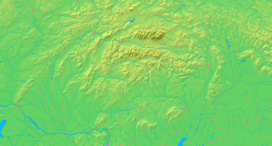Ducové
| Ducové | |
| Village | |
| View on the village from the Kostolec hill | |
| Country | Slovakia |
|---|---|
| Region | Trnava |
| District | Piešťany |
| Elevation | 200 m (656 ft) |
| Coordinates | SK 48°37′40″N 17°52′05″E / 48.62778°N 17.86806°ECoordinates: SK 48°37′40″N 17°52′05″E / 48.62778°N 17.86806°E |
| Area | 2.63 km2 (1.02 sq mi) |
| Population | 357 (31 December 2004) |
| Density | 136/km2 (352/sq mi) |
| First mentioned | 1348 |
| Mayor | Mária Koláriková (independent) |
| Postal code | 922 21 |
| Area code | +421-33 |
| Car plate | PN |
  Location of Ducové in Slovakia | |
  Location of Ducové in the Trnava Region | |
| Wikimedia Commons: Ducové | |
| Statistics: MOŠ/MIS | |
| Website: www.ducove.sk | |
Ducové is a municipality (village) situated in western Slovakia, near the spa town of Piešťany. It was part of the municipality Moravany nad Váhom from 1976 to 1992. The village lies under the Váh Inovec. According to the 2011 census, the municipality had 375 inhabitants. 365 of inhabitants were Slovaks and 10 others and unspecified.[1]
Etymology
The name of the village is derived from dux-ducis meaning duke.[2] Duka was also a borrowed word used by the Slavs for a person with a prominent social status.[2] The village was known as 1348 Duchreuy, 1453 Duczev, 1521 De-chobrod, 1532, 1638 Ducibrod, 1576 Ducybrod, 1636 Duczowa, 1664 Ducó, 1667 Duczo, 1668 Duczove, 1693 Duczowa, 1753 Duczó, 1776 Duczo, 1773 Duczo, Dutzo, Duczowe, 1786 Duczo, Duczowce, 1808 Duczó, Ducow, 1863 -1918 Ducó, 1920 Ducov, Ducové, 1927 Ducové.[3][4]
Great Moravian Court
Ducové is known for an archaeological site on the Kostolec hill, where a Great Moravian fortified settlement has been unearthed. Excavations of older settlements from the Stone Age, Bronze Age and the Roman era indicate that Ducové benefited from its location on the Amber Road well before the Great Moravian era. The Slavic court was founded in the mid-9th century after the fall of the nearby hill fort in Pobedim, frequently associated with the unification of principality of Moravia and Nitra. The court was similar to Frankish courts from the 8th-9th centuries and inhabited by representatives of the Slavic elite.[5] It was protected by a massive oak palisade, doubled on one side and built on top of the prehistoric mound.[5] Administrative and representative functions were highlighted by the strategic location near the river ford.[6] Interior space was divided by additional palisades and occupied by residential buildings, outbuildings, a Christian rotunda church and a graveyard. The round rotunda with an apse is similar to rotunda found in Staré Město.[7] The court existed until 940-970[8] when it burned, most likely during the attack of the old Hungarians. The rotunda and the graveyard had been used by neighbouring villages also after the destruction of the residential buildings, the rotunda until the 11-12 century and the graveyard until the 14th.[7]
The site is registered as a National Cultural Landmark. Some parts of the court (such as its palisades) have been reconstructed by archaeologists.
See also
References
- ↑ http://portal.statistics.sk/files/obce-narodnost.pdf
- 1 2 Turčan 2012, p. 47.
- ↑ Majtán, Milan (1998). Názvy obcí Slovenskej republiky: vývin v rokoch 1773-1997. Bratislava: VEDA, vydavateľstvo Slovenskej akadémie vied. p. 600. ISBN 80-224-0530-2.
- ↑ "História". The official website of Ducové. Retrieved 14 October 2015.
- 1 2 Ruttkay 2007, p. 192.
- ↑ Ruttkay 2007, p. 193.
- 1 2 Botek 2014, p. 101.
- ↑ Turčan 2012, p. 50.
Sources
- Botek, Andrej (2014). Veľkomoravské kostoly na Slovensku [The Great Moravian Churches in Slovakia] (in Slovak). Bratislava: Post Scriptum. ISBN 978-80-89567-37-9.
- Ruttkay, Alexander (2007). "Významné archeologické lokality z včasného stredoveku v oblasti Považského Inovca" [Important Archaeological Sites from the Early Middle Ages in the Region of Považský Inovec]. In Pieta, Karol; Ruttkay, Alexander; Ruttkay, Matej. Bojná, hospodárske a politické centrum Nitrianskeho kniežactva (in Slovak and German). Nitra: Archeologický ústav SAV. ISBN 978-80-88709-91-6.
- Turčan, Vladimír (2012). Veľkomoravské hradiská [The Great Moravian Castles] (in Slovak). Bratislava: Dajama. ISBN 978-80-8136-013-8.
Genealogical resources
The records for genealogical research are available at the state archive "Statny Archiv in Bratislava, Slovakia"
- Roman Catholic church records (births/marriages/deaths): 1783-1905 (parish B)
- Lutheran church records (births/marriages/deaths): 1783-1922 (parish B)